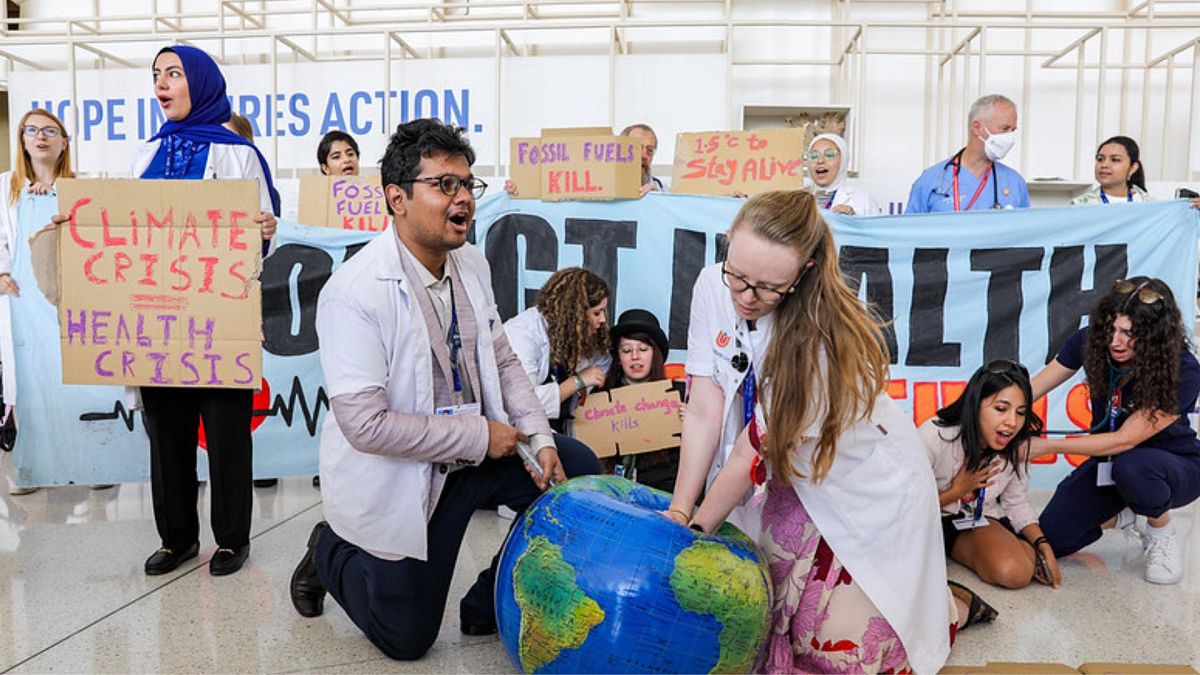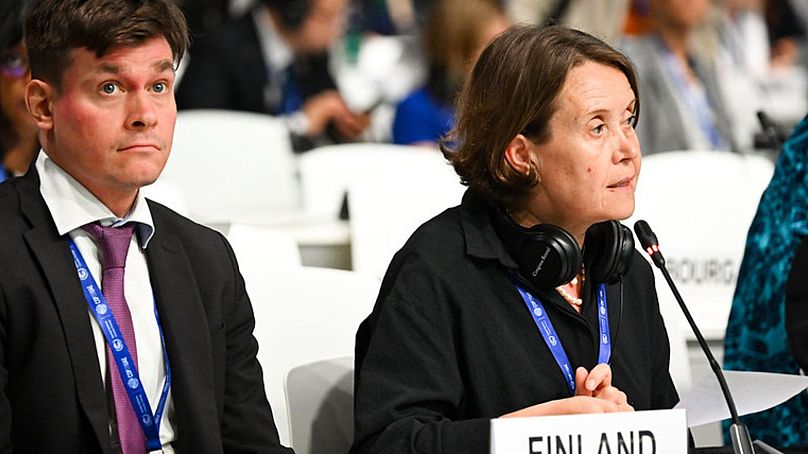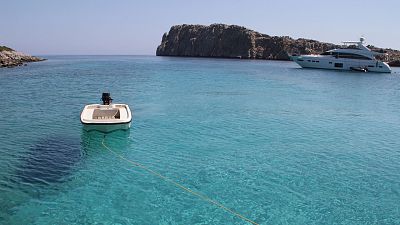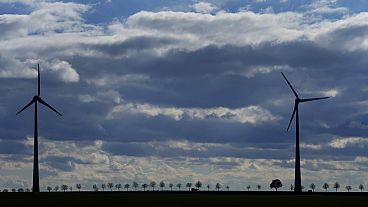Governments are halfway through negotiations and opinion is divided on the chances of success at the landmark climate talks.
The COP28 climate summit in Dubai enters its second week tomorrow (8 December). As delegates take a well-earned rest day, how much progress has been made so far?
As always, it depends who you ask. Sultan Al Jaber, the UAE’s COP president who has been tasked with overseeing the negotiations, is feeling outwardly positive.
“I think, based on the momentum, the traction, and all that has been happening over the past week, we can agree that there is something special happening here at COP28 and in Dubai,” he told a plenary of country negotiators yesterday.
Not everyone is in full agreement with that half-way point assessment, however.
“The first week of climate negotiations in Dubai saw some surprising successes and some frustrating failures,” says Dr Stephen Cornelius, the World Wildlife Fund (WWF)’s Deputy Global Climate and Energy Lead.
“Overall, the progress was typically slow and didn't reflect the urgency called for by science and people suffering from the climate crisis. There is a lot to do in the remaining five days of negotiating time to achieve the course correction needed to adequately respond to the climate emergency.”
What are the key outcomes from COP28 week 1?
Many seasoned climate campaigners were doubtful about what could be achieved at a climate conference in a petrostate, headed by a man who is also the CEO of Abu Dhabi National Oil Company (ADNOC). And many still are.
But COP28 did get off to a quick start, with the summit agendas adopted within hours, and the new Loss and Damage fund for climate victims created and mobilised on day 1 (30 November). The agreement to create this fund was the historic result of COP27 last year; a decades-long demand from developing countries finally realised, helping to rebuild frayed trust between the global north and south.
How much loss and damage funding has been raised?
With the loss and damage fund officially open, pledges flowed in from a number of countries - including Germany, Italy, France and the UAE - totalling $726 million (€674 million). But that’s far from being the end of the story. For one thing, it can take a notoriously long time for money pledged at COPs to materialise - and start making a difference to those who need it most.
And climate campaigners are far from satisfied with the loss and damage contributions so far.
“Please don’t be fooled,” Harjeet Singh, head of global political strategy at Climate Action Network (CAN), told COP attendees during a protest inside the inner blue zone yesterday. “It’s nothing compared to the profit the fossil fuel industry is making." The oil and gas industry’s profit jumped to $4 trillion (€3.7 trillion) last year, the International Energy Agency (IEA) previously calculated.
Meanwhile the irreversible economic and non-economic impacts of climate change - which the new fund is meant to address - stand at around $400 billion (€371 billion) and rising, according to the Loss and Damage Collaboration NGO. That means the current pledges cover just 0.2 per cent of developing countries’ costs from climate breakdown.
Fossil fuels: What are countries doing about the number one cause of climate change at COP?
There’s been a number of positive announcements out of COP in recent days, on energy and other fronts.
11 pledges and declarations have been launched, and received mixed levels of multinational support, which should help to make a tangible difference across a range of areas - including agriculture, health and peace - as they intersect with climate change.
$83 billion (€76.9 billion) in financial pledges and contributions has been raised so far, the presidency says.
The Global Renewables and Energy Efficiency Pledge, endorsed by 123 countries, aims to triple the world’s renewable energy capacity by 2030 and double its energy efficiency.
But more wind turbines and solar panels won’t help mitigate the climate crisis one jot if fossil fuels aren’t also phased down or out. Countries have yet to agree on the precise wording of their verdict on fossil fuels, and it's set to be the key battleline in the coming days.
For communities on the frontlines of the crisis, this issue is also a test ground for the continued credibility of COP.
“If we allow major polluting countries to block a phase out of fossil fuels at COP28, then the UNFCCC process is broken,” says Joseph Sikulu, Pacific managing director of international environmental organisation 350.org. “We are here every year, fighting for our survival and are undermined at every point by the polluting nations and corporations.
“Don’t tell me a phaseout of fossil fuels is complex when our people are finding ways to raise entire islands.”
One source of hope came from a particular country: Colombia. It became the 10th to join an alliance of nations calling for a fossil fuel non-proliferation treaty last week. That’s an inspiring move because the Latin American country is a significant producer of oil, gas and coal.
“This is not economic suicide. We are avoiding the omnicide of the world, of planet Earth,” president Gustavo Petro announced in front of other world leaders at the summit.
What happens next at COP28?
Quick off the blocks, negotiations faltered towards the end of the first week, commentators say.
Key texts that will form the outcome of COP28 are still riddled with brackets of different options and disagreements, indicating different avenues that world action could go down.
These have now been handed to the COP presidency, explains Dr Cornelius. With Al Jaber indicating that they will continue technical negotiations alongside minister-led and heads of delegation consultations in the remaining five days to 12 December.
One of the most important texts to be finalised concerns the ‘Global Stocktake’ - a major two-year assessment of countries’ Nationally Determined Contributions (NDCs). These national strategies to cut emissions are taken stock of every five years, as per the 2015 Paris Agreement to limit global heating to 1.5C.
The results of this ‘report card’ were revealed just before the start of COP28. As Teresa Anderson, ActionAid International’s Global Lead on Climate Justice puts it, “Its assessment is quietly devastating.
“A C-minus grade on performance would be too kind. The frankly pathetic action since Paris is already resulting in floods, droughts, cyclones, heatwaves, ocean warming, and catastrophic crop failures. Billions of lives are at stake.”
The multilateral response is currently contained in a long draft text, with multiple options including a fossil fuel phaseout. Ministers have a lot to do to deliver content related to NDCs which will credibly signal the necessary course correction for climate action, according to WWF.
There’s plenty more detail from a dramatic first week at COP28 to dig into, of course. Including a moment of particularly high drama when the COP president was revealed as saying that there was ‘no science’ behind calls for a fossil fuel phase out - and held an impromptu press conference to quell the outrage.
You can take a look back at our daily live blogs from Dubai - starting with a recap of yesterday, day 7.
We're still on the ground at COP and our daily live blogs will start again tomorrow (Friday).




